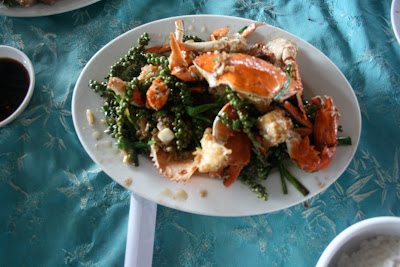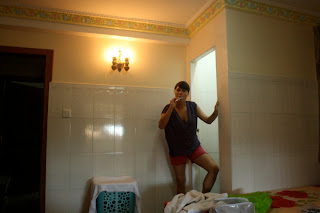"Be careful because Cambodia is the most dangerous place you will ever visit. You will fall in love with it, and eventually it will break your heart." -Joseph Mussomeli, past U.S. Ambassador to Cambodia (Cambodia's Curse, 2010)
At the end of the day I still ask myself, "why do we travel?" Why do we torture ourselves with leaving our homes and all we know; why do we torture ourselves with falling in love with such gorgeous people - only to disappear and probably never see them again; why do we run away? From personal experience and from research through travel memoirs, etc., it's because we are constantly trying to learn more about ourselves (also, of course about the world as well!). And it's always the same - we leave expecting a revelation, may it be about whatever, but we always return asking ourselves why we left, because it's always been and always will be either right in front of us or within us. I guess I'll never learn, nor do I plan to.
I'm sad to leave. Even though it's been a struggle and a journey of extreme highs and lows, and no matter how much I miss my home, I am very sad to leave. Quite sad, confused, and moved.
I look back on my time here and it seems so short and I feel pathetic. At the same time however, I have received plenty of verification that my efforts have been effective and hugely appreciated. When I think about my time in Cambodia, why I came, why I stayed, it was really all for my students - something I didn't know would happen. My fifteen students - young, old, quiet, loud. It's also been my director Emily, whose generosity (understatement of the century), has been the single force that has inspired me to teach. The other night was the Transform Cambodia staff dinner and party. While there, I was suddenly overwhelmed by this organization's inconceivable charity. There's so much love. Every staff member I met, all of the foreigners who support TC, and of course my students, have touched my heart. No not touched it, but skewered it with unimaginable kindness. Last week I toured the centers (as there were Christmas performances and parties) with some of the founders and sponsors and they all made an impression on me. After many tears shed by all, I didn't realize how much I missed them already. They love me.
I felt lonely here a lot. I sometimes felt useless. But most of all, I felt and feel blessed that I got to work within this organization. Mine has been an experience of ecstatic joy and curiosity to a string of real low points. I discovered limitations; mind-tweaking frustration; people's motives; people - from every background, foreground, and situation that you can imagine; cultural boundaries; and of course all the superficial stuff that I'm supposed to learn at this point. Most importantly and most notably what I have taken away from this experience is Transform's heart.
It's true what they say about how you don't really know a country until you live in it. It's true that it doesn't matter where you are but who you're with. And, as if this couldn't get any more soft or introspective - it's true, there's no place like home.
At the end of the day I still ask myself, "why do we travel?" Why do we torture ourselves with leaving our homes and all we know; why do we torture ourselves with falling in love with such gorgeous people - only to disappear and probably never see them again; why do we run away? From personal experience and from research through travel memoirs, etc., it's because we are constantly trying to learn more about ourselves (also, of course about the world as well!). And it's always the same - we leave expecting a revelation, may it be about whatever, but we always return asking ourselves why we left, because it's always been and always will be either right in front of us or within us. I guess I'll never learn, nor do I plan to.
I'm sad to leave. Even though it's been a struggle and a journey of extreme highs and lows, and no matter how much I miss my home, I am very sad to leave. Quite sad, confused, and moved.
I look back on my time here and it seems so short and I feel pathetic. At the same time however, I have received plenty of verification that my efforts have been effective and hugely appreciated. When I think about my time in Cambodia, why I came, why I stayed, it was really all for my students - something I didn't know would happen. My fifteen students - young, old, quiet, loud. It's also been my director Emily, whose generosity (understatement of the century), has been the single force that has inspired me to teach. The other night was the Transform Cambodia staff dinner and party. While there, I was suddenly overwhelmed by this organization's inconceivable charity. There's so much love. Every staff member I met, all of the foreigners who support TC, and of course my students, have touched my heart. No not touched it, but skewered it with unimaginable kindness. Last week I toured the centers (as there were Christmas performances and parties) with some of the founders and sponsors and they all made an impression on me. After many tears shed by all, I didn't realize how much I missed them already. They love me.
I felt lonely here a lot. I sometimes felt useless. But most of all, I felt and feel blessed that I got to work within this organization. Mine has been an experience of ecstatic joy and curiosity to a string of real low points. I discovered limitations; mind-tweaking frustration; people's motives; people - from every background, foreground, and situation that you can imagine; cultural boundaries; and of course all the superficial stuff that I'm supposed to learn at this point. Most importantly and most notably what I have taken away from this experience is Transform's heart.
It's true what they say about how you don't really know a country until you live in it. It's true that it doesn't matter where you are but who you're with. And, as if this couldn't get any more soft or introspective - it's true, there's no place like home.
Final dinner with the family who lives below us at Master Suki Soup!













































